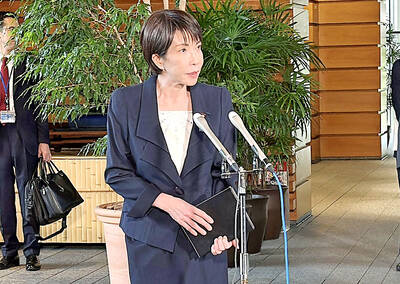Japan's Princess Kiko can do no wrong these days. Since bearing a male heir to the Chrysanthemum Throne this week, she has been extolled as a model wife, a paragon of motherhood and even a national symbol of courage.
The mass adulation of cheerful Kiko, who gave birth to a boy by Caesarean section on Wednesday, has clashed strikingly with the image of Crown Princess Masako and her highly publicized troubles in adjusting to palace life.
The contrast between the two princesses has even prompted some in Japan to declare that Kiko and her husband, Prince Akishino, have now trumped his older brother Crown Prince Naruhito and Masako in the imperial pecking order.
"Crown Prince and Prince Akishino reverse the fraternal hierarchy," declared the Weekly Bunshun on Thursday, detailing how Kiko mixes cocktails for her husband's friends and keeps a close eye on her daughters' table manners.
"She's cheerful, she smiles, she doesn't look like she's thoroughly miserable," said Jeff Kingston, director of Asian studies at Temple University in Tokyo.
"Princess Masako has definitely not adjusted well and Kiko has adjusted perfectly," he added.
The differences between the two princesses go way back.
Kiko and Akishino, college sweethearts, married in 1990 after a five-year courtship. Masako, meanwhile, a Harvard-educated career diplomat, made Naruhito wait two months after his first proposal for a reply.
After their 1993 marriage, excruciating pressure fell on Masako to produce a male heir to the throne. She suffered a miscarriage in 1999, had a daughter, Aiko, in 2001, then fell into a stress-induced depression that still keeps her away from most public imperial functions.
Kiko, in the less pressured role as wife of Emperor Akihito's second son, has apparently thrived -- in the media spotlight as well as at the palace. The conservative Yomiuri newspaper this week reported how she carried out her duties even when pregnant with her first child.
The differences between the couples were accentuated when Naruhito, in a rare display of imperial candor, criticized court officials at a news conference in 2004 for restricting Masako's activities.
Soon after, Akishino publicly broke with his brother, telling reporters he and the emperor were surprised by Naruhito's remarks and that the crown prince should have consulted with his father before talking publicly.
The drumbeat of praise for Kiko has steadily risen with her pregnancy, and hit fever pitch this week after she delivered the one thing that Masako hasn't: a male heir to the throne.
Many Japanese, especially conservatives, had high hopes for a boy, since the royal family had not produced a male heir since Akishino himself was born in 1965. Kiko's child is now third in line to the throne behind Naruhito and Akishino.
In some ways, the difference in the two princesses' images reflects conservative values in Japan, where women are traditionally expected to stay at home and care for their husbands and children.

‘MOTHER’ OF THAILAND: In her glamorous heyday in the 1960s, former Thai queen Sirikit mingled with US presidents and superstars such as Elvis Presley The year-long funeral ceremony of former Thai queen Sirikit started yesterday, with grieving royalists set to salute the procession bringing her body to lie in state at Bangkok’s Grand Palace. Members of the royal family are venerated in Thailand, treated by many as semi-divine figures, and lavished with glowing media coverage and gold-adorned portraits hanging in public spaces and private homes nationwide. Sirikit, the mother of Thai King Vajiralongkorn and widow of the nation’s longest-reigning monarch, died late on Friday at the age of 93. Black-and-white tributes to the royal matriarch are being beamed onto towering digital advertizing billboards, on

Indonesia was to sign an agreement to repatriate two British nationals, including a grandmother languishing on death row for drug-related crimes, an Indonesian government source said yesterday. “The practical arrangement will be signed today. The transfer will be done immediately after the technical side of the transfer is agreed,” the source said, identifying Lindsay Sandiford and 35-year-old Shahab Shahabadi as the people being transferred. Sandiford, a grandmother, was sentenced to death on the island of Bali in 2013 after she was convicted of trafficking drugs. Customs officers found cocaine worth an estimated US$2.14 million hidden in a false bottom in Sandiford’s suitcase when

POWER ABUSE WORRY: Some people warned that the broad language of the treaty could lead to overreach by authorities and enable the repression of government critics Countries signed their first UN treaty targeting cybercrime in Hanoi yesterday, despite opposition from an unlikely band of tech companies and rights groups warning of expanded state surveillance. The new global legal framework aims to bolster international cooperation to fight digital crimes, from child pornography to transnational cyberscams and money laundering. More than 60 countries signed the declaration, which means it would go into force once ratified by those states. UN Secretary-General Antonio Guterres described the signing as an “important milestone,” and that it was “only the beginning.” “Every day, sophisticated scams destroy families, steal migrants and drain billions of dollars from our economy...

PRESSURE: Trump is expected to demand that Tokyo raise its defense spending, but Japan’s new foreign minister said the amount is less important than how it is spent Japan plans to show its determination to further build up its defense to rapidly adapt to changing warfare realities and growing tension in the region when US President Donald Trump visits Tokyo next week, Minister of Foreign Affairs Toshimitsu Motegi said. Japanese Prime Minister Sanae Takaichi’s administration is also finalizing a purchase package, including US pickups, soybeans and gas, to present to Trump, but would not commit to any new defense spending target at the meeting, a source with knowledge of the preparations said. The two leaders are to sit down in Tokyo on Monday and Tuesday next week during Trump’s first